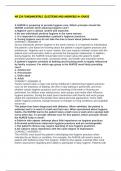Exam (elaborations)
NR 224 FUNDAMENTALS QUESTIONS AND ANSWERS/ A+ GRADE
- Course
- Institution
NR 224 FUNDAMENTALS QUESTIONS AND ANSWERS/ A+ GRADE A NURSE is preparing to provide hygiene care. Which principle should the NURSE consider when planning hygiene care? a.Hygiene care is always routine and expected. b.No two individuals perform hygiene in the same manner. c. It is important...
[Show more]



